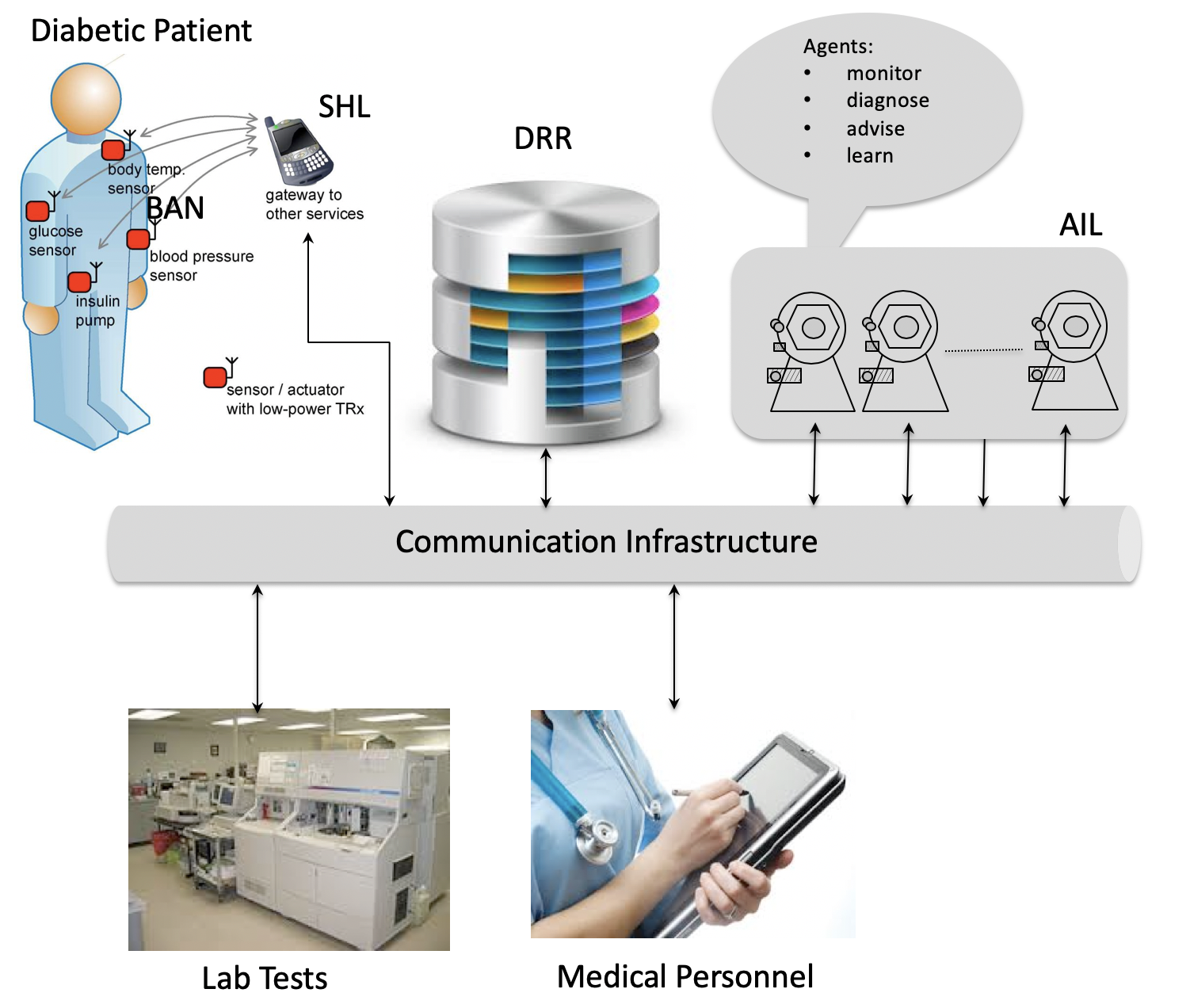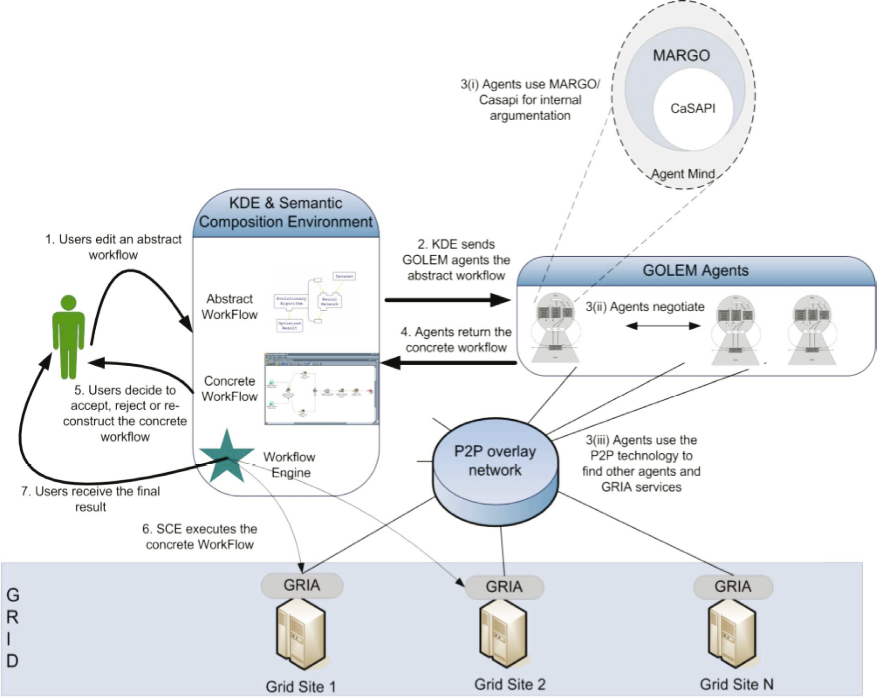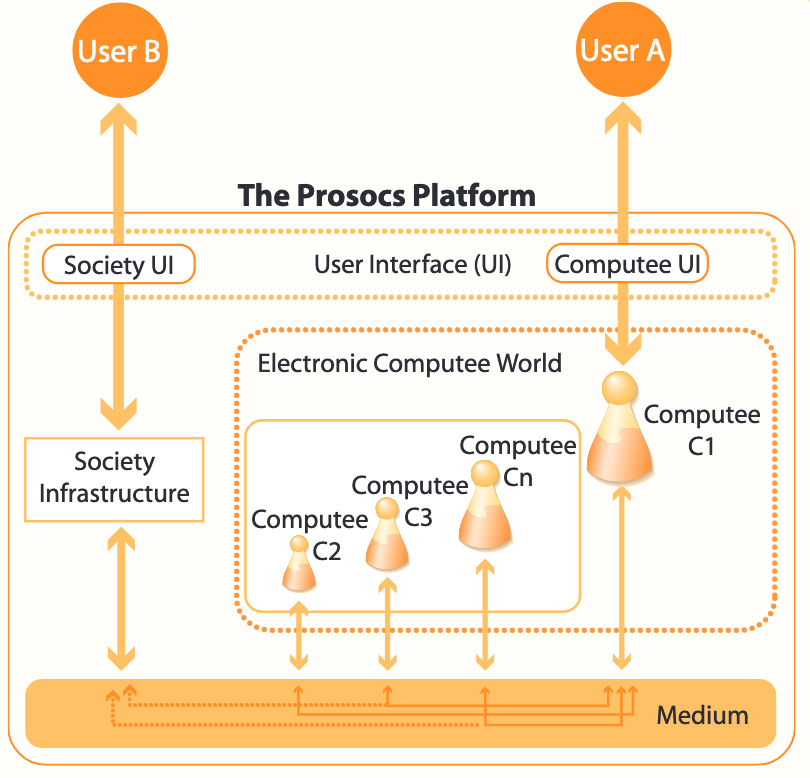Research Projects
Current Projects
Completed Projects
The lab has participated in UKRI and EU projects with other institutions in the UK and in Europe.
- Detecting privacy problems that originate from insufficient security within Android applications, looking from different perspectives (e.g., multiple static analysis tools vs multiple dynamic analysis tools).
- Defining and building a multi-purpose ontology (ASO) of security issues in the context of Android applications.
- Using ASO to translate and aggregate reports from different Android application analysis tools, so to create an automation-friendly final security report.
- Using the aforementioned final report, together with a model of the law on data protection to perform logical reasoning, in order to infer undetected security issues, and detect violation of the law, and predict legal consequences.
We developed ASO, an Android Security Ontology which models the security problems that can be encountered within Android applications. A visualisation of ASO is available here.
Our agent platform, MagnetDroid, conducts parallel analyses of an Android APK using available analysis tools, retrieves and consolidates the generated reports, and translates them into a unified format. A post-analysis framework then makes use of the final report and a legal model to perform logical reasoning, identify potential violations of legal prescriptions, and predict legal outcomes, such as fines.
The lab’s contributions to this project, in terms of pubblications have been:
- Emanuele Uliana, Kostas Stathis, Robert Jago: MagnetDroid: security-oriented analysis for bridging privacy and law for Android applications. ICAIL 2019: 123-132.
 The lab’s contributions in this project are summarised below:
The lab’s contributions in this project are summarised below:
- Bedour Al-Rayes and Kostas Stathis. An Agent Architecture for Adaptive Decision Making in Negotiation Environments. In Proceedings of EWG-DSS Workshop on Exploring New Directions for Decisions in the Internet Age, Thessaloniki, Greece, May 2013.
- Bedour Alrayes, Özgür Kafali, and Kostas Stathis. CONAN: a heuristic strategy for con- current negotiating agents. In Ana L. C. Bazzan, Michael N. Huhns, Alessio Lomuscio, and Paul Scerri, editors, International conference on Autonomous Agents and Multi-Agent Systems, AAMAS ’14, Paris, France, May 5-9, 2014, pages 1585–1586. IFAAMAS/ACM, 2014.
- Bedour Alrayes, Özgür Kafalı, and Kostas Stathis. Recon: A robust multi-agent environment for simulating concurrent negotiations. In Naoki Fukuta, Takayuki Ito, Minjie Zhang, Katsuhide Fujita, and Valentin Robu, editors, Recent Advances in Agent-based Complex Au- tomated Negotiation, chapter 10, pages 157–174. Springer International Publishing, Cham, 2016.
- Bedour Alrayes, Özgür Kafalı, and Kostas Stathis. Concurrent Bilateral Negotiation for Open E-Markets: The CONAN Strategy. Knowledge Information Systems, 56(2):463–501, 2018.
- Jack Hopkins, Özgür Kafalı, Bedour Alrayes, and Kostas Stathis. PIRASA: strategic protocol selection for e-commerce agents. Electronic Markets, 29(2):239–252. 2019
- Quentin Baert, Anne-Cécile Caron, Maxime Morge, Jean-Christophe Routier, Kostas Stathis: Adaptive Multi-agent System for Situated Task Allocation. AAMAS 2019: 1790-1792.
- Quentin Baert, Anne-Cécile Caron, Maxime Morge, Jean-Christophe Routier, Kostas Stathis: A Location-Aware Strategy for Agents Negotiating Load-balancing. ICTAI 2019: To appear.
- Attention Guidance Agents for the MATBII cockpit task: Demo. Durant, S., Wilkins, B., Woods, C., Uliana, E., Stathis, K., Pre-proceeding of EMAS’21.
- Attention Guidance Agents with Eye-tracking: A use-case based on the MATBII cockpit task. Durant, S., Wilkins, B., Woods, C., Uliana, E. & Stathis, K., 3 Oct 2021, (Accepted/In press) Post-Proceedings of EMAS’21. Springer, (LNCS).
 COMMODITY12 proposed a four-layered platform structured as follows:
COMMODITY12 proposed a four-layered platform structured as follows:
- Body Area Network Layer (BAN): this layer employs sensors to monitor the patient physiological signals and performs multi-parametric aggregation of data for the Smart Hub layer.
- The Smart Hub Layer (SHL): this layer receives aggregated data from the BAN and applies machine learning to classify the signals and provide indications about abnormalities in the curves. SHL will communicate with DRR over the cell-phone network.
- The Data Representation And Retrieval Layer (DRR): this layer interfaces to the SHL and utilises existing medical data to perform information retrieval and produce structured information for the agents at the AIL.
- The Artificial Intelligence Layer (AIL): this layer uses the DRR layer to retrieve structured background knowledge of the patient for intelligent agents applying diagnostic reasoning in order to advise on the patient’s condition.
The lab’s contributions in this project have been:
- Özgur Kafali, Stefano Bromuri, Eduardo Aguilar-Pelaez, Michal Sindlar, Tom van derWeide, Michael Schumacher, Esther Rodriguez-Villegas, and Kostas Stathis. A Smart e-Health Environment for Diabetes Management. Journal of Ambient Intelligence and Smart Environments, 5(5):479–502, 2013. DOI: https://dx.doi.org/10.3233/AIS-130220.
- Ulrich Schaechtle, Kostas Stathis, and Stefano Bromuri. Multi-dimensional Causal Discovery. In Proceedings of the 23rd International Joint Conference on Artificial Intelligence (IJCAI 2013), pages 1649–1655, Beijing, China, August 2013.
- Ozgur Kafali, Michal Sindlar, Tom van der Weide, and Kostas Stathis. ORC: an Ontology Reasoning Component for Diabetes. In Proceedings of 2nd International Workshop on Artificial Intelligence and Netmedicine (NetMed’13), IJCAI 2013, Beijing, China, August 3rd 2013.
- Ozgur Kafali, Alfonso E. Romero, and Kostas Stathis. Activity recognition for an agent-oriented personal health system. In Hoa Khanh Dam, Jeremy V. Pitt, Yang Xu, Guido Governatori, and Takayuki Ito, editors, PRIMA 2014: Principles and Practice of Multi-Agent Systems, pages 254–269. Springer, Australia, Dec 2014.
- Özgür Kafalı, Ulrich Schaechtle, and Kostas Stathis. HYDRA: a HYbrid Diagnosis and monitoRing Architecture for diabetes. In 16th International Conference on E-health Networking, Application & Services (HealthCom’14), Brazil, 15-18 Oct 2014. IEEE.
- Pedro J. Navarro, Diego Alonso, and Kostas Stathis. Automatic detection of microaneurysms in diabetic retinopathy fundus images using the L*a*b color space. J. Opt. Soc. Am. A, 33(1):74–83, Jan 2016.
- Bozidara Cvetkovic, Vito Janko, Alfonso Romero, Ozgur Kafali, Kostas Stathis, and Mitja Lustrek. Activity recognition for diabetic patients using a smartphone. Journal of Medical Systems, 40(256), Dec 2016.
- Ozgur Kafali, Alfonso Romero, and Kostas Stathis. Agent-oriented activity recognition in the event calculus: An application for diabetic patients. Computational Intelligence, 33(4):899–925, 2017.
 Within ARGUGRID, agents are associated with service requestors and service providers. The agents encompass the logic for internal decision making and are equipped with methods for negotiation with other agents. With the support of argumentation processes, the agents decide which services can be used for fulfilling the demands of users and also how to create, manage and join virtual organisations, understood as societies of agents, to compose individual services into more complex ones.The work focused on e-business application scenarios, but its results are outreaching to all kinds of applications.Our lab’s contributions to this project were:
Within ARGUGRID, agents are associated with service requestors and service providers. The agents encompass the logic for internal decision making and are equipped with methods for negotiation with other agents. With the support of argumentation processes, the agents decide which services can be used for fulfilling the demands of users and also how to create, manage and join virtual organisations, understood as societies of agents, to compose individual services into more complex ones.The work focused on e-business application scenarios, but its results are outreaching to all kinds of applications.Our lab’s contributions to this project were:
- Vasa Curcin, Moustafa Ghanem, Yike Guo, Kostas Stathis, and Francesca Toni. Building next generation Service-Oriented Architectures using Argumentation Agents. In 3rd International
Conference on Grid Services Engineering and Management (GSEM 2006), Germany, September 2006. - Stefano Bromuri and Kostas Stathis. Situating Cognitive Agents in GOLEM. In Engineering Environment Mediated Multi-agent Systems, Dresden, Germany, October 2007. Springer.
- Francesca Toni, Mary Grammatikou, Stella Kafetzoglou, Leonidas Lymberopoulos, Symeon Papavassiliou, Dorian Gaertner, Maxime Morge, Stefano Bromuri, Jarred McGinnis, Kostas Stathis, Vasa Curcin, Moustafa Ghanem, and Li Guo. The ArguGRID Platform: An Overview. In Jörn Altmann, Dirk Neumann, and Thomas Fahringer, editors, Grid Economics and Business Models, 5th International Workshop, GECON 2008, volume 5206 of Lecture Notes in Computer Science, pages 217–225. Springer, August 26 2008.
- Maxime Morge and Kostas Stathis. The agent argumentation architecture revisited. In Proc. of the Sixth European Workshop on Multi-Agent Systems (EUMAS’08), pages 1–15, Bath, UK, 2008.
- Maxime Morge, Jarred McGinnis, Stefano Bromuri, Paolo Mancarella, and Kostas Stathis. An Argumentative Model for Service-oriented Agents. In Marcello Balduccini and Chitta Baral, editors, Proc. of the International Symposium on Architectures for Intelligent Theory Based Agents, page 6, Stanford University, California, USA, March 2008. AAAI Spring Symposium Series.
- Stefano Bromuri, Visara Urovi, Maxime Morge, Kostas Stathis, and Francesca Toni. A Multiagent System for Service Discovery, Selection and Negotiation. In Carles Sierra, Cristiano Castelfranchi, Keith S. Decker, and Jaime Simão Sichman, editors, 8th International Joint Conference on Autonomous Agents and Multiagent Systems (AAMAS 2009), Budapest, Hungary, May 10-15, 2009, Volume 2, pages 1395–1396. IFAAMAS, 2009.
- Stefano Bromuri and Kostas Stathis. Distributed Agent Environments in the Ambient Event Calculus. In Aniruddha S. Gokhale and Douglas C. Schmidt, editors, Proceedings of the Third ACM International Conference on Distributed Event-Based Systems, DEBS 2009, Nashville, Tennessee, USA, July 6-9, 2009. ACM, 2009.
- Visara Urovi and Kostas Stathis. Playing with Agent Coordination Patterns in MAGE. In COIN 2009 International Workshop, Revised Selected Papers, volume 6069 of Lecture Notes in Computer Science, pages 86–101. Springer, 2010.
- Jarred McGinnis, Kostas Stathis, and Francesca Toni. A Formal Model of Agent-Oriented Virtual Organisations and their Formation. Multi-Agent and Grid Systems, 7(6):291–310, December 2011. DOI: https://dx.doi.org/10.3233/MGS-2011-0179.
 The project had three phases: phase 1 – formal models; phase 2 – computational models; and phase 3 – verification and experiments. During phase 1, we undertook studies that integrate hypothetical, temporal and argumentation-based reasoning in order to model logically individual computees. We then developed a logical framework for interactions amongst computees. This will establish interactions amongst computees via direct communication, whether based on standard protocols or emerging from individual communicative behaviours. In phase 2 we developed computational models for the logical models of individual computees and their interactions. To support these computational models, a complete experimental demonstrator was developed which was tested on scenarios and examples on varying scales. Finally in phase 3, we identified significant and desirable properties of computees and their societies, and proved formally under what circumstances these properties hold. Results were validated using the prototype demonstrator embodying the formal models.The techniques developed provided a practical basis for the design of classes of systems and applications, which require aggregate behaviour of computational entities. For more details see here.Our lab’s contributions to this project were as follows:
The project had three phases: phase 1 – formal models; phase 2 – computational models; and phase 3 – verification and experiments. During phase 1, we undertook studies that integrate hypothetical, temporal and argumentation-based reasoning in order to model logically individual computees. We then developed a logical framework for interactions amongst computees. This will establish interactions amongst computees via direct communication, whether based on standard protocols or emerging from individual communicative behaviours. In phase 2 we developed computational models for the logical models of individual computees and their interactions. To support these computational models, a complete experimental demonstrator was developed which was tested on scenarios and examples on varying scales. Finally in phase 3, we identified significant and desirable properties of computees and their societies, and proved formally under what circumstances these properties hold. Results were validated using the prototype demonstrator embodying the formal models.The techniques developed provided a practical basis for the design of classes of systems and applications, which require aggregate behaviour of computational entities. For more details see here.Our lab’s contributions to this project were as follows:
-
- Oscar de Bruijn and Kostas Stathis. Socio-Cognitive Grids: The Net as a Universal Human Resource. In Proceedings of the Conference of “Tales of the Disappearing Computer”, Santorini, June 2003.
- Antonis C. Kakas, Paolo Mancarella, Fariba Sadri, Kostas Stathis, and Francesca Toni. The KGP model of Agency. In Proceedings of the 16th European Conference of Artificial Intelligence (ECAI04), pages 33–37, Valencia, 2004.
- Kostas Stathis, Antonis C. Kakas, Wenjin Lu, Neophytos Demetriou, Ulle Endriss, and Andrea Bracciali. PROSOCS: a platform for programming software agents in computational logic. In J. Müller and P. Petta, editors, Proceedings of the Fourth International Symposium “From Agent Theory to Agent Implementation” (AT2AI-4 – EMCSR’2004 Session M), pages 523–528, Vienna, Austria, April “13-16″ 2004.
- Antonis Kakas, Paolo Mancarella, Fariba Sadri, Kostas Stathis, and Francesca Toni. Declarative Agent Control. In Proceedings of the 5th International Workshop on Computational Logic in Multi-agent Systems (CLIMA V), pages 96–110, Lisbon, 2004. Springer.
- Andrea Bracciali, Paolo Mancarella, Kostas Stathis, and Francesca Toni. Stable Multi-Agent Systems. In Proceedings of the 5th International Workshop on Engineering Societies of the Agents World (ESAW 04), Toulouse, 2004.
- Kostas Stathis and Francesca Toni. Ambient Intelligence using KGP Agents. In Proceed- ings of the 2nd European Symposium for Ambient Intelligence, pages 351–362, Eindhoven, November 2004. LNCS, Springer-Verlang.
- Andrea Bracciali, Paolo Mancarella, Kostas Stathis, and Francesca Toni. On Declarative Modelling of Multi-agent Systems. In Proceedings of the 2nd International Workshop on Declarative Agent Languages and Technologies, New York, 2004. Springer Verlang. LNCS.
- Andrea Bracciali, Neophytos Demetriou, Ulle Endriss, Antonis Kakas, Wenjin Lu, Paolo Mancarella, Fariba Sadri, Kostas Stathis, Giacomo Terreni, and Francesca Toni. The KGP Model of Agency for Global Computing: Computational Model and Prototype Implementation. In Global Computing 2004, volume 3267 of Lecture Notes in Computer Science. Springer.
- Andrea Bracciali, Neophytos Demetriou, Ulle Endriss, Antonis Kakas, Wenjin Lu, and Kostas Stathis. Crafting the mind of a PROSOCS agent. Applied Artificial Intelligence, 20(4-5):105–131, 2006. DOI: http://dx.doi.org/10.1080/08839510500479496.
- Fariba Sadri, Kostas Stathis, and Francesca Toni. Normative KGP agents. Computational & Mathematical Organization Theory, 12(2-3):101–126, 2006. DOI: http://dx.doi.org/ 10.1007/s10588-006-9539-5.
- Jeremy Forth, Kostas Stathis, and Francesca Toni. Decision making with a KGP agent system. Journal of Decision Systems, 15(2-3):241–266, 2006. DOI: http://dx.doi.org/10. 3166/jds.15.241-266.
- Antonis C. Kakas, Paolo Mancarella, Fariba Sadri, Kostas Stathis, and Francesca Toni. Computational logic foundations of KGP agents. J. Artif. Intell. Res. (JAIR), 33:285–348, 2008. DOI: http://dx.doi.org/10.1613/jair.2596.


